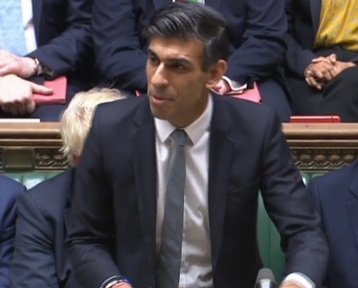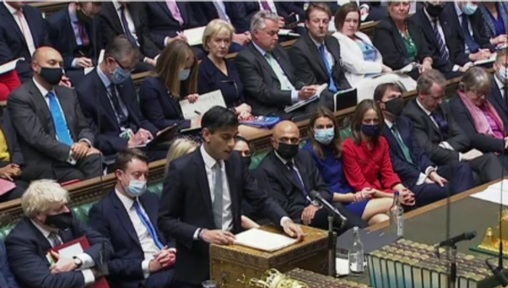Budget: Social care 'left out in the cold' as emergency cash plea to Chancellor ignored
Contrary to the care sector’s hopes of money for social care in Chancellor Rishi Sunak's Budget and Spending Review, his speech indicated a cold winter lay ahead for care providers facing staff shortages.

Days before his Budget speech, Chancellor Rishi Sunak announced almost £6bn for the NHS, on top of a large share of the funds raised over the next three years from the new health and social care levy.
'Months ahead will be challenging'
Mr Sunak’s Budget fell on the same day as the Comprehensive Spending Review (CSR) which sets out the government’s spending priorities for the next three years, from 2022-23 to 2024-25.
In his speech, the Chancellor announced new grant funding for councils of £4.8bn over the next three years.
Mr Sunak also announced Universal Credit claimants will keep more of the money they earn with Universal Credit taper rate being cut by eight per cent. The amount people can earn before starting to lose the benefit will also rise by £500 a year.
But there was little mention of adult social care as Mr Sunak told MPs: “Growth up, jobs up and debt down, let there be no doubt, our plan is working.”
As care providers listened, the Chancellor told the nation: the “months ahead will be challenging”. He said the economy would return to pre-covid levels by the end of 2021.
Referring to a new immigration policy, Mr Sunak announced a ‘Scale-Up Visa’ system will make it quicker and easier for fast-growing businesses to bring in highly-skilled individuals. Mr Sunak said the immigration measure will "identify, attract and relocate the best global talent in key science and tech sectors".
Care home and home care providers have said care workers are not low-skilled and must be added to the UK’s shortage occupation list to ease the sector’s staffing challenges.

Emergency £3bn for social care requested
In the same week, Stephen Chandler, the president of ADASS (Association of Directors of Adults Social Services) urged Mr Sunak to “act decisively" to stabilise care this winter in his Budget and Spending Review, by giving an extra £3bn immediately to strengthen home care, meet unmet needs and ease the care workforce crisis.
He urged the Chancellor to introduce a new employment deal for care staff, including a workforce strategy, enhanced training and an adult social care minimum wage level with comparable NHS roles at a rate of approximately £11.50 an hour.
But care leaders hoping for more funding for social care were soon disappointed after Mr Sunak delivered his speech.
Sam Monaghan, chief executive of care home operator MHA tweeted: “Are those of us in social care surprised by the lack of funding laid out in today's budget? I think not - but disappointment rings heavy.
"Social care yet again absent and older people and those who care valiantly for them - forgotten and still underfunded.”

After the Chancellor’s speech, Martin Green, chief executive of Care England, which represents care homes, said: “Unfortunately, there will be serious and far reaching consequences.
"We have been left out in the cold; winter is going to be very, very tough without a robust social care sector to support the NHS.
“Failure to support the sector will result in unprecedented demand on the NHS, a loss to local economies and of course a failure to deliver care to those most in need”.
Announcements made public by the Treasury days before the Budget, revealed a rise in the National Living Wage from £8.91 per hour to £9.50, to come into effect from 1 April next year.
Mr Sunak’s Budget and CSR document mentioned the previously announced new Health and Social Care Levy, which it said would deliver £5.4 billion of additional funding to reform adult social care.
The document stated: ‘Supporting the health and social care systems is one of the government’s top priorities.The government is also delivering on its commitments to reform social care for the long term'.
It stated the Levy, along with a rise in the rates of dividend tax, ‘will raise around £13 billion per year for spending on health and social care across the UK’ and ‘will end unpredictable costs for people’ in England by introducing a cap of £86,000 for personal care costs and expanding the means tested support to people with less than £100,000 in relevant assets.
The Treasury document said at least £500 million from this package will fund investment in the skills, qualifications and wellbeing of the care workforce.
The Chancellor also announced he will be lifting a pay freeze imposed on public sector workers including nurses.
Mr Sunak told MPs of a “challenging backdrop of rising inflation” which is likely to rise further. The Office for Budget Responsibility (OBR) expects inflation will hit four per cent and predicts the economy will recover more quickly than previously forecast. In its latest forecast the OBR expects the UK economy to grow by 6.5 per cent in 2021.
Labour leader Keir Starmer tested positive for Covid and was not present to respond to the Budget. Instead Shadow Chancellor Rachel Reeves took his place to question the Chancellor.
“Why can’t Britain do better than this?” asked Rachel Reeves. “Cuts to our public services have cut them to the bone. Describing a "low growth economy", she said: “The government has been weakened by the pandemic but also by the government’s mishandling of it.”
‘Underwhelmed'
Along with care home owners and home care providers, charities shared their disappointment over the Chancellor's speech.
Gavin Terry, head of policy at Alzheimer’s Society said: “While some additional local funding has been announced, it’s nowhere near enough to prop up social care until 2023. This will only lead to the increased rationing of care, which is already spread dangerously thin."
Caroline Abrahams, charity director of Age UK, said: "Today, social care needed a big injection of guaranteed, additional funding for now and the future, but the Chancellor didn't deliver it. The extra money that was announced for local government was not ring-fenced for social care and will need to be stretched thinly across council services."
Dr Rhidian Hughes, chief executive of disability charity VODG, added: “We are left underwhelmed by a series of flat and feeble commitments."
Dr Hughes said social care is "far from" funded and fixed, despite recent social care reform and workforce funding announcements, stating it was “simply not enough".
While welcoming the rise in the National Living Wage, he said "for our members, who rely on local authority commissioners to deliver these services, such rises also bring about additional concern as to how, and whether, such increases will be funded."
He warned the risk remains “of disabled people having services pulled away, and providers being left with a depleted workforce.”
Latest News
 29-Jul-24
Dementia Bus gives carehome.co.uk staff insight into life with dementia
29-Jul-24
Dementia Bus gives carehome.co.uk staff insight into life with dementia
 01-Mar-24
Find out the top care homes in 2024
01-Mar-24
Find out the top care homes in 2024
 21-Mar-23
UK's top care homes in 2023 revealed
21-Mar-23
UK's top care homes in 2023 revealed
 03-Jan-23
carehome.co.uk launches free care helpline
03-Jan-23
carehome.co.uk launches free care helpline
 13-Dec-22
5 mins with Emily Whitehurst, chief operating officer for Constantia Healthcare
13-Dec-22
5 mins with Emily Whitehurst, chief operating officer for Constantia Healthcare